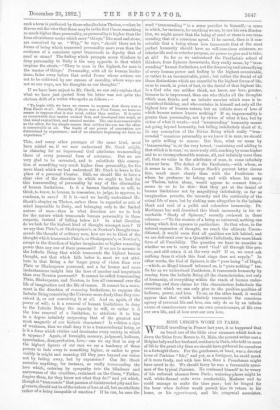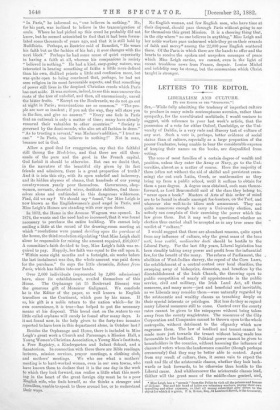MISS LEIGH'S WORK IN PARIS.
WHILE travelling in France last year, it so happened that on board one of the little river steamers which took us down the Seine from Rouen to St. Melo, the present writer met a Belgian lady and her husband, residents in Paris, who told us more of life in the great city than we should have gathered for ourselves in a fortnight there. For the gentleman, at least, was a devoted lover of Parisian "life ;" and yet, as a foreigner, he could speak of it more freely, and with less bias, than a Frenchman might have cared to do. We should fancy he was a favourable speci- men of the typical Parisian. He confessed himself to be weary of his enforced absence from Paris ; watering-places might be well, white-flannel suits were comfortable, Madame and he could. manage to make the time pass ; but he longed for the hour when fashion would permit him to return to his home, or his appartement, and his congenial associates.
" In Paris," he informed us, "one believes in nothing." He, for his part, was inclined to believe in the transmigration of souls. Where he had picked up this creed he probably did not know, but he seemed astonished to find that it had been formu- lated some thousands of years ago, and that it is still held by Buddhists. Perhaps, as Beatrice said of Benedict, " Ke wears his faith but as the fashion of his hat ; it ever changes with the next block." Perhaps he had some sense of quiet superiority in having a faith at all, whereas his companions in society "believed in nothing." He had a kind, easy-going nature, was interested in hearing something of faiths a little more defined than his own, disliked priests a little and confession more, but was quite open to being convinced that, perhaps, he had not seen religion in its most favourable aspects, and that something of power still lives in the despised Christian creeds which Paris has cast aside. It was curious, indeed, to see this man uncover the roots of the tree of unbelief, and then, all unconsciously, unveil the bitter fruits. "Except on the Boulevards, we do not go out at night in Paris ; assassinations are so common." "The peo- ple are now so insolent ; if you ask the way, they will stare you in the face, and give no answer." "Every one feels in Paris that an outbreak is only a matter of time; many have already removed their valuables to other countries." " Society is governed by the demi-monde, who also set all fashion in dress." "As to trusting a servant," was Madame's addition, "I trust no one." "In Paris, one believes in nothing I" Not in man, because not in God.
Allow a good deal for exaggeration, say that the faithful still throng the Madeleine, and that there are still thou- sands of the pure and the good in the French capital. God forbid it should be otherwise. But can we doubt that, in the narrative of the beautiful city given by its fast friends and admirers, there is a great proportion of truth ? And it is into this city, with its open unbelief and indecency, and its hidden abysses of shame, that hundreds of our young countrywomen yearly pour themselves. Governesses, shop- women, servants, deserted wives, destitute children, find them- selves alone and unfriended in this dangerous wilderness. Find, did we say P We should say "found," for Miss Leigh is now known as the Englishwomen's good angel in Paris, and Miss Leigh's Homes are standing with ever open doors.
In 1872, the Home in the Avenue Wagram was opened. In 1874, the wants and the need had so increased, that it was found necessary to purchase the entire building. We cannot help smiling a little at the record of the drawing-room meeting at which "resolutions were passed decial`ng upon the purchase of the house, the third resolution stipulating that Miss Leigh shall alone be responsible for raising the amount required, £10,000!' A committee's faith decided to buy, Miss Leigh's faith was re- quired to pay. Happily, her faith was equal to the call upon it. "Within some eight months and a fortnight, six weeks before the last instalment was due, the whole amount was paid down for the purchase." So says the little chronicle, Echoes from Darla, which has fallen into our hands.
Over 2,000 individuals (represented by 2,695 admissione) have, since its establishment, availed themselves of this
Home. The Orphanage (at 35 Boulevard Bineau) was the generous gift of Monsieur Galignani. We conclude he is the Editor of the paper, so well known to English travellers on the Continent, which goes by his name. If SO, his gift is a noble return to the nation which—for its own convenience, it is true—has helped to put the necessary means at his disposal. This bread cast on the .waters to our little exiled orphans will surely be found after many days. Is it not found now, in the help given to the forty-two inmates reported to have been in this department alone, in October last ?
Besides the Orphanage and Home, there is included in Miss Leigh's great work a Church and Parsonage, a Mission Hall, a Young Women's Christian Association, a Young Men's Institute, a Free Registry, a Kindergarten and Infant 'School, and a Sanatorium. In connection with these there are Bible readings, lectures, mission services, prayer meetings, a clothing club, and mothers' meetings. We who see what a mothers' meeting is to hard-worked. women, even in. our own towns, who have known them to declare that it is the one day in the week to which they look forward, can realise a little what this meet- iug in the heart of the great foreign city must be to a poor English wife, who finds herself, as she thinks a stranger and friendless, unable to speak to those around her, or to understand their ways. No English woman, and few English men, who have time at their disposal, should pass through Paris without going to see for themselves this great Mission. It is a cheering thing that, in the city where "no one believes in anything," Miss Leigh and her noble workers pass unharmed while they go on their errands of faith and mercy* among the 22,000 poor English scattered there. Of the Paris in which there are the hands to offer and the hearts to receive the spoken and unepoken messages of peace which Miss Leigh carries, we cannot, even in the light of recent troublous news from France, despair. Louise Michel and infidelity may be strong, but the communism which Christ taught is stronger.


































 Previous page
Previous page